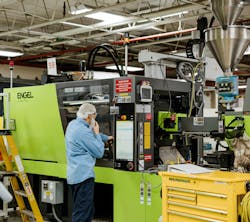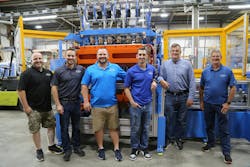By Karen Hanna
For leaders of companies established over decades, passing on a family business isn’t the same as passing on Grandma’s favorite china set — unless you’re considering the fragility of the inheritance.
The value is clear to Gretchen Hoffer Farb, co-CEO of Hoffer Plastics, everyday she comes to work and walks through an atrium filled with the bonsai trees her grandfather, Bob Hoffer — the company’s founder — loved.
At some point most mornings, the custodian will come in, walk into her office and grab a protein bar, then pass into her sister’s office, where they listen to Disney songs on a streaming app.
To Hoffer Farb, that routine is just as important as anything else the custom molding shop produces each day. The custodian, Jordan — the nonverbal son of another company employee — has autism and might not find work somewhere else, but at the third-generation-owned Hoffer Plastics, he’s found a home.
“I always go back to why I wanted to come here, and a lot of it had to do with influence. ... We can make decisions that may not make economical sense but make good sense within our values," said Hoffer Farb, who initially did audit and tax work at a public accounting firm in Chicago before returning in 2003 to the South Elgin, Ill., business Bob Hoffer started 50 years earlier.
Now the co-CEO of the company alongside her sister and brother, Charlotte Hoffer Canning, and Alex Hoffer, Hoffer Farb, 50, said Jordan’s routine brightens her day.
For some owners of family companies, the legacy and independence that come with maintaining their business trump any mergers and acquisitions (M&A) deal a larger company might make.
Making a name
Offer him a billion dollars for the company his grandfather started, and Steven Rocheleau has a ready answer: “No.”
Rocheleau Tool & Die started in 1938 as a machine shop, before moving into blow molding equipment manufacturing in 1964, where it’s since carved out its niche.
“We’re in more than 40 countries around the world. So, as a small company, it’s a pretty neat opportunity to have that. When you travel and you’re somewhere in Central America or Mexico or the Caribbean, and you walk in and they’re like, ‘Hey, your name’s the same as the machine name,’ it carries weight,” said Rocheleau, the company’s president and one of its three owners. “And then somebody will tell you, ‘Thank you. I’ve worked with your grandfather, and the machinery has made me a living, and my kids went to college because of the money we made running your machinery.’ There’s a generational pride that goes along with it.”
Not that every day at the family business is easy.
At least, according to Rocheleau, it’s not.
"When the days are good, there’s nothing better, but when they’re bad, there’s nothing worse,” he said with a laugh. “Because you really can't escape it. ... Historically, you look at family businesses, not just plastics, but just in general, you have a founder that’s successful because it’s his [or her] passion, and then they have a second generation of their direct children that come in, and they carry that passion forward. And the third generation is usually the ones that squander it. We took over in 2001, so it’s been 25 years, and we’ve been fortunate to grow and be successful, but we had that worry or that chip on our shoulder, like, ‘We’re not going to be that third gen that screws it up.’ ”
Assuming the helm
Both the Rocheleau and Hoffer teams found ways to handle the transition with care. Both experienced their own long road to leadership.
“My dad was the last of the second generation, and when he turned 55, he was the sole owner of the company,” said Rocheleau, the middle sibling of a triad now aged 55-61. “He told us, ‘I’m retiring on my 60th birthday. We have five years to figure this out,’ and so we set up a management team in our third generation, and we operated with that management group for that five-year period while my dad was still here overseeing that. So, when he left, when he retired, it was really seamless because we had been running with that management group for five years already, under his guidance.”
Around the same time, Hoffer Farb was at a crossroads of her own.
Now the mother of an 18-year-old, she recalled, “When I was my daughter’s age, so the age of Gen 4, I would have told you, ‘There’s no way I’m working here.’ ”
But around the time she and her husband got married, she realized, “If I was ever going to work at the company, this is my time.”
Having spent summers there as a student, she worked the first nine months under the tutelage of the company’s materials manager.
Even now, she said, she’s willing to take on any job, at any time — for her, that comes with the sense of ownership and pride of having her name on the building.
“If I’ve got a customer coming, I have no problem vacuuming the hallways," she said.
That approach built credibility, but it’s the first leadership decision she and her sister and brother made together that she credits with the trio’s success: To facilitate their transition, they agreed to retain the services of a coach to help them navigate the challenges they knew would come.
Around eight years later, they’re still working with the same person, and they make every decision only after reaching consensus. They even vacation together.
"That’s the work we’ve done with our coach: What does disagreement look like? What does decision-making look like? We were very intentional about how we would set this up in our operating principles and how this would work, so that there was clarity," she said.
The siblings — Hoffer Farb calls them a coalition, while employees call them collectively G-3 — took over the company in 2020 from Hoffer Farb’s father. William Hoffer, who had run the business for 15 years, remains chairman.
The siblings respect each other’s strengths, voice their own opinions and work together to make decisions. While they each take part in decision-making, Hoffer Farb said her specialties involve finance, the supply chain and the company's charitable foundation, while her sister is focused on human relations and marketing and her brother focuses on sales and operations.
It’s made them effective co-CEOs and provided stability that Hoffer Farb said contributes to a harmonious work environment — for everyone.
“It even gives our employees a lot of comfort knowing that we like each other. The kids come visit and we keep it playful, but we have a lot of hard things we have to do. But we still spend holidays together, and we travel together, and we enjoy each other's families and support one another. And that’s one of the most important things that we can do as leaders, in keeping the business healthy, is keep our relationships healthy," she said.
Company heirs
The inheritance of a family business carries responsibilities from one generation to the next. While Rocheleau and Hoffer Farb expressed gratitude and pride in their own roles, they’re also contemplating who’s on deck.
Buy or sell?
Advice from experts on getting the best out of a merger or acquisition. Read on.
“You can always look back and say, ‘What if I did something different?’ But I think we were fortunate that everybody in our third generation was truly passionate about working here. ... So, it worked out for us because I don’t think anyone in our generation was in that position, feeling like they were held hostage by that. I think everybody that was here had a passion, both for family business and for plastics and packaging,” he said.
He said the company already is training the fourth generation — currently five members of that cohort are in the workforce of about 60 — and putting people in position to gain responsibility, so just like him, they’ll be ready when their time comes.
He said it’s important “it’s not just dumped in their lap,” which he has seen torpedo other family businesses.
Like Rocheleau, Hoffer Farb said her family is committed to maintaining the family line. But she said she doesn’t want anyone to feel stuck.
“The generational stewardship is certainly very important," Hoffer Farb said.
Born just before Hoffer Plastics' founder died in 2007, Hoffer Farb’s daughter is his oldest great-grandchild and the first of the next generation. But Hoffer Farb isn’t sure she’ll want to work for the family business — her passion is for interior design.
And that’s OK, Hoffer Farb said.
"We have the conversations,” she said, “but I never felt pressured, and I will not do that to my children, either. You can’t sit in this seat without wanting to make an impact. No different than you tell anyone else, ‘We want you to want to be here. We want you to create excellence. I want you to be part of this team, and that’s a choice.’ ”
True to their values
In May, Hoffer Farb was looking forward to this month’s company barbecue where she and her daughter and other members of the family and leadership would serve the company’s 350 or so employees.
A self-described “mama bear” toward the people who work at Hoffer Plastics, she repeatedly cited her company’s values — family, integrity, service and trust — as the throughline between her grandfather and every successive generation.
She and the rest of the coalition have an open-door policy, and anyone can just drop in — even if it’s only to sing a Disney song.
The company even employs its own chaplain.
“Many of our employees have worked here for decades, and honoring their service is important to us, and honoring the people that are in the room [is] important to us. ... We serve the customers, we serve the employees, and we serve the family as part of the business,” she said.
Since 1966, the Hoffer Foundation, which Bob Hoffer started, has raised millions of dollars for local charities and organizations, including the Boys and Girls Club of Elgin, Sherman Hospital and United Way, as well as families in need.
The company’s put its stamp on the community, and Hoffer Farb can’t imagine it in anyone else’s hands.
“This is ours, and it’s ours to do well. So, you take it very personally. ... That’s why we want to keep it in the family. Because we feel a strong commitment to our employees and a strong commitment the foundation has to this community.”
Contact:
Hoffer Plastics, South Elgin, Ill., 847-741-5740, https://hofferplastics.com
Rocheleau Tool & Die Co. Inc., Fitchburg, Mass., 978-345-1723, www.rocheleautool.com
About the Author
Karen Hanna
Senior Staff Reporter
Senior Staff Reporter Karen Hanna covers injection molding, molds and tooling, processors, workforce and other topics, and writes features including In Other Words and Problem Solved for Plastics Machinery & Manufacturing, Plastics Recycling and The Journal of Blow Molding. She has more than 15 years of experience in daily and magazine journalism.



